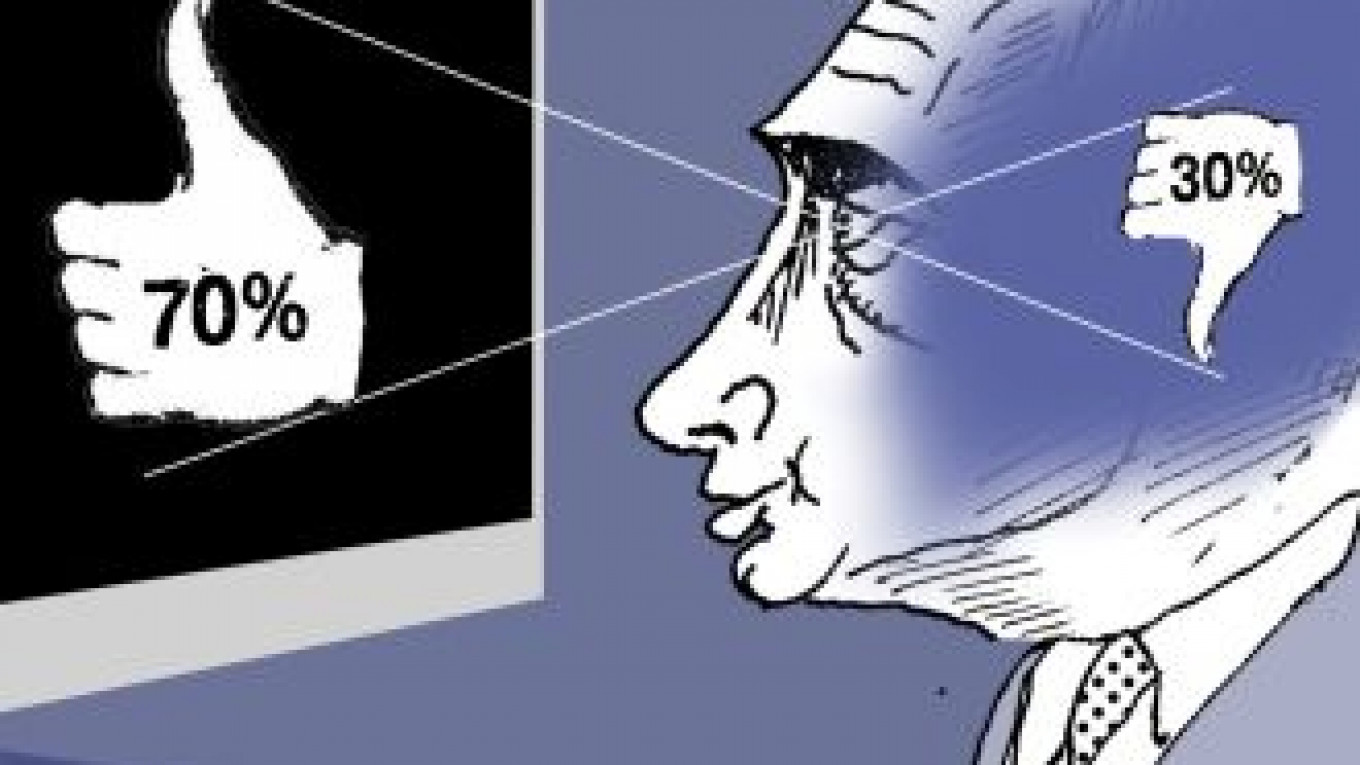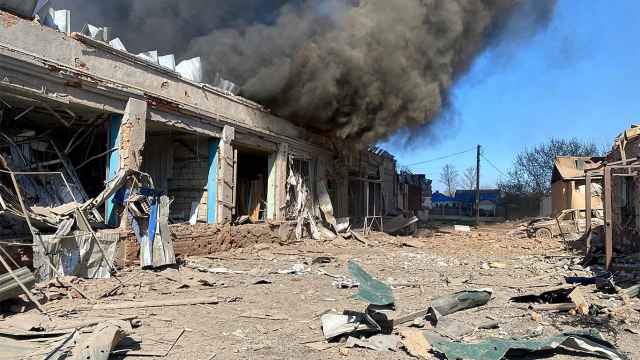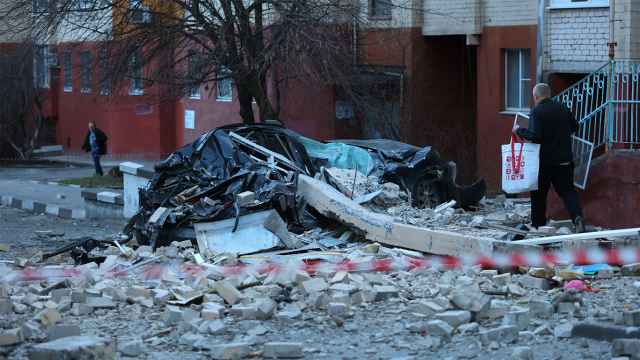State Duma Deputy Oleg Mikheyev from the Just Russia party came up with an original idea to lift the spirits of people depressed by all of the bad news they face every day from the country's leading media outlets. Last week, he presented a new bill that would force Russia's main media to limit their amount of "negative information" to 30 percent, while boosting the amount of "positive information" to 70 percent. Journalists found in violation of these rules could face prison sentences of two to six years.
Citing unspecified "medical norms," Mikheyev said the 30 percent figure is the "maximum allowable amount" of negative information that most people can endure without damaging their psyche. When the amount of negative information exceeds 30 percent, which it clearly has by several times already, the stress level of many people rises to the point where they suffer "spontaneous attacks of rage and aggression," Mikheyev said. Too much negative information also "weakens their ability to think and lowers their creative powers."
The first problem with this bill, of course, is who would determine what is "positive" and "negative" information? Take, for example, a television report that shows a police raid on a group of corrupt government officials. Some may consider this negative news because it shows another incident of high-level graft. It may also be depressing for those who think it is just a state-orchestrated PR stunt and that no one will end up being punished anyway. But other people may consider it positive news that the police are disgracing corrupt officials on nationwide television.
The second problem is that Mikheyev has got the cause-effect relationship of negative information all wrong. The media is much less a cause of society's ills than it is a mirror image of those ills. The human psyche is much more traumatized by what is experienced in everyday life than what is seen on television or read in newspapers. The list of everyday Russian woes is long, but it includes: having to pay high prices for goods at low salaries (compared with European and U.S. standards) because of the corruption that pervades every sector of society; waiting in lines at an outpatient clinic for substandard medical care; having to pay money to administrators for a spot for their child in kindergarten that by law is supposed to be free; and trying to raise a family in an overcrowded apartment with relatives because there is no affordable mortgage system.
Mikheyev and other deputies should be spending their time and efforts in the Duma addressing these grass-roots problems of their electorate and not try to cowardly shift the blame for society's woes onto the media.
Hiding behind an affected concern for people's health, Mikheyev is essentially trying to cover up the government's incompetence, inaction and corruption. I f the media doesn't talk about these problems, it's as if they don't exist, right? As Josef Stalin cynically told Russians during the height of his repression, "Life has become better; life has become happier."
Mikheyev's bill is an attempt to go back to the Soviet way of presenting a rosy picture of the country. Those who grew up during the Soviet period remember the Orwellian evening news, which typically started with the general-secretary giving Hero of Labor awards to workers who achieved record production results — a practice that President Vladimir Putin, incidentally, wants to return. After that was a report about how the Voronezh winter-boot factory opened up a seventh assembly line because of the overwhelming global demand for their high--quality products in export markets (including in Africa and Cuba). This was followed by a report on the rising standard of living of Soviet workers in Kirov, showing the head of the regional Communist Party meeting with a smiling family that had just moved into a spacious, free apartment provided by the state.
In the international affairs section, the anchor would often mention the rising international authority of the Soviet Union and how much it has done to advance global peace, while chastising the war, violence, crime and global instability caused by the U.S. This anti-Americanism component easily filled the Soviet Union's quota for negative news. Or perhaps it was considered "positive" since comparisons with the "crime-ridden" and "morally corrupt" U.S. helped raise people's spirits concerning the merits of Soviet communism.
On one level, it would be easy to dismiss Mikheyev's bill as a cheap attempt to draw attention to himself, a first-term deputy who is largely unknown to the public. By writing about his absurd bill, the media is only playing into his personal publicity campaign, you could argue. Why give him a free advertisement?
At the same time, however, by drawing attention to this and other nonsensical bills, the media can draw attention to the low quality and competence of Duma deputies — a direct consequence of the flawed Duma elections a year ago. It also underscores the inherent flaws of the party-list system in which deputies are determined not by a direct vote by the electorate but by party leaders who, in many cases, divvy out Duma seats to their colleagues in opaque, behind-the-scenes deals.
In response to Mikheyev's initiative, perhaps Ilya Ponomaryov or one of the few other forward-looking deputies should propose another bill — to limit the number of ridiculous Duma bills to 30 percent. Better still: 1 percent, if possible. This would mean no more bills on foreign agents, no more legislation "offending the religious feelings of others" or expanding the treason law to include Russians who consult foreign organizations, and no more bills outlawing U.S. adoptions of Russian children to avenge the U.S. Magnitsky Act.
They say countries filled with "good news" on television and in newspapers have prisons filled with good people. This accurately describes the Soviet Union, Belarus, North Korea and other dictatorships. Although Mikheyev's initiative has little chance of becoming law, it is still a disturbing reminder that there are still far too many politicians in the Duma and Kremlin who are looking backward for their political models.
Let's hope that the next Duma elections in 2016 will be conducted fairly and based more on the single--mandate system where voters elect specific candidates instead of choosing from incomplete and misleading party lists. Let's also hope that there will be more deputies with democratic principles who will concentrate on solving their electorate's grass-roots problems instead of focusing on self-promotional PR. That would be good news, indeed.
Michael Bohm is opinion page editor of The Moscow Times.
Related articles:






